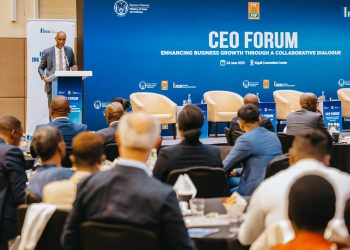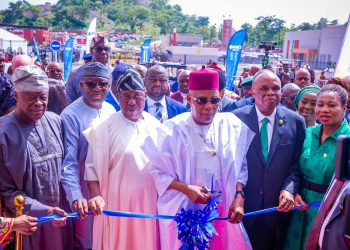History is being written in Kigali, Rwanda. African countries are discussing what has baffled many for decades. Why is it difficult for Africa to trade between itself? Why is it very hard for Africans to travel, live and work from any African country? One pointer has been the issue of lack of free movement of person in Africa. This debate has been going on and on for ages.
The African Union has talked about confronting the matter since time immemorial. The cost, the damage, and the misery it has subjected Africans to is unimaginable. It has rendered Africa permeable for Western occupation and exploitation.
Africa is losing over US$260 billion annually through several activities such as “illicit financial outflows”, corporations taking out profits and the costs imposed by climate change.
In return, as a sign of gratitude for allowing the exploitation, African countries receive about US$210 billion in aid, loans and foreign investment. This is annual deficit of US roughly $50 billion.
While this is happening, as Africa remains the leading green market, with abundant opportunities, Africans can not easily move around to exploit these opportunities. Nigerian Billionaire Aliko Dangote, says despite him having billions of dollars capable and ready to invest on the continent, he needs 38 visas to travel across Africa.
Following the mandate given to him during the African Union Summit held in Kigali in July, 2016, President Kagame has been leading the reform process of which among the issues to be reformed include African countries opening up their doors. This, however, has become such a sensitive matter, going by what we observed during the just concluded Second Member States Experts’ Meeting on the Draft Protocol on Free Movement of Persons in Africa, in Kigali that took place from May 23 to 26 , 2017.

The draft had 35 articles. Very well articulated. Simple to understand. A draft document was shared. Each article had explanation notice for deeper understanding.
For example, article 20 prohibits any member state to conduct a ‘mass expulsion’ of nationals from another state based on nationality, race, ethnic group, colour, sex, language, political opinion, and many other elements.
This subject, it being discussed in Rwanda, a country whose nationals have experienced this victimisation, had a good example to offer, but the discussion remained tenacious. Tanzania and Uganda for example once expelled Rwandans and Rwanda on the other side as a victim. While these countries understood the intensity of the matter, others had no clue if this case even ever existed.
This was not it. Other countries such as South Africa, a country that has experienced violent waves due to hostility subjected to fellow Africans from other states, were also in the room. South Africa’s position on opening up doors, many believed, was going to be more understanding and courageous enough to admit that being stringent on entry can turn out to be useless. No. That was not the case.
In brief, as each participant came in as an expert, those whose countries believe they are well equipped, knowledgable, and understanding enough to contribute fruitfully so that the “protocol” can be signed as soon as possible and set the Africans free to travel, trade and visit their neighbours.
Instead, discussions dragged on and on with many citing this and that. So fearful and concerned not to say, “we are good to go, let’ sign it brother and sister.” It was kind of a show off, who knows international laws better, protocols better, ratifications better, treaties better, security better, war and terrorism better, etc.
Finally, sensing the need for taking leadership to shape the discussion for a useful and positive deliberation, Katyen Jackden, the chairperson of the AU committee of the free movement of persons in Africa, saw the dialogue come out with a concrete document, which will be shared and discussed by Heads of States next year,
“The benefits of liberalizing movement across the continent outweigh the potential security and economic challenges that may be generated as a result,” said Katyen Jackden, and insisted participants to think and take a positive position on the matter since different countries are at different stages of readiness.
As the Chairperson of the AU Reform Commission, Presidents Kagame, has devoted resources and efforts of his institutions in support of this program. Speaking at the opening of the meeting, the Director of Rwanda’s External Intelligence, Col. Francis Mutiganda, told Taarifa that, “Obviously if you look at the kind of advantages that we draw from opening borders, we hope that most countries in Africa are going to change.”
In exclusive interview shortly after he delivered his opening remarks, Col. Mutiganda spoke with Taarifa. Below are excerpts.

What is Rwanda’s position on this matter?
Col. Mutiganda: Rwanda has opened its borders to allow free movement. The implications of free movement are enormous. They enable the promotion of trade, trade engagement between African states, in terms of technology transfers and movement of labor. With that we believe our economies can immensely benefit from trade. That is our main focus; the promotion of trade that will lead to the development of Africa.
This is very interesting for reasons that Rwanda looks at it from a positive point of view while some raise more concerns than the advantages. What could be the cause?
Col. Mutiganda: Their concerns are genuine, but they are not insurmountable. It is about security challenges, which could be addressed by working together, by strengthening the advantages. The more you work together, the more you confront those challenges than isolating yourself with hope that those challenges would remain outside your borders. And it is demonstrated that countries with more stringent visa regimes are currently facing more security challenges than some of the countries that have opened doors. That is why in Accra, in Addis Ababa and recently in Kampala, we used specific examples of countries that have opened their borders, and how it has benefited their economies. That was mainly Rwanda, Ghana, Tunisia and Senegal. We tried to show that with open borders there is more vibrancy in trade and it has not compromised their security.
How much influence does Rwanda have in this whole process, considering that the country has cases where its people have experienced aggressive treatment in the past, case in point is of the mass expulsion by host states such as Tanzania and Uganda?
Col. Mutiganda: It is very significant because this is being done in the context of an attempt to reform the African Union. Which is a responsibility that has been given to our president Paul Kagame and we have devoted most of our institutions in support of that program. That is part of the context. The other context is the desire to have a continent that is engaged between itself. It is ridiculous to open our borders for other people from other continents and shut our own people outside of borders. Obviously if you look at the kind of advantages that we draw from opening borders, we hope that most countries in Africa are going to change.
What exactly are the issues that you have to confront, real obstacles?
Col. Mutiganda: First of all, they are not many. It is a minority of countries that have challenges on one hand, and concerns on the other hand. Like I said they are general, but we believe if they are not insurmountable, they can be resolved.
What are they?
Col. Mutiganda: The first is about security. They believe that with the current death profile about terrorism around, a lot of people may increase that threat. In Rwanda we don’t believe in those cases, because the most affected countries are not those whose borders are more open. Second, they believe that mass migration, if ratified, would increase exploitation. And the issues that come with mass migration including, for example, some countries believing that their economies are attractive to foreigners to the extent that they are exposed to illegal migration. That too, is not a case. For example, look at what we have achieved in Rwanda and Kenya, and compare that with what is going on in South Africa. South Africa has closed borders, but they are the most affected in terms of illegal migration. In that case, what can we do to support South Africa or what can they learn from the rest of the other countries. The third concern is that some countries benefit from selling their visas or restricting individuals who may come to their countries to take over jobs and distort their markets. That could be a general concern, but whether you accept or not, the global trends will force you to open yourself in unplanned manner. So, we are better off integrating systematically together.
Related article
https://taarifa.rw/2017/05/28/deal-done-no-travel-restriction-in-africa/
Pictorial:
























Photos by Natasha Batamuriza
Meanwhile, below is a video of President Kagame speaking on African Union Reforms implementation.Conakry, Guinea, 24 April 2017.



















